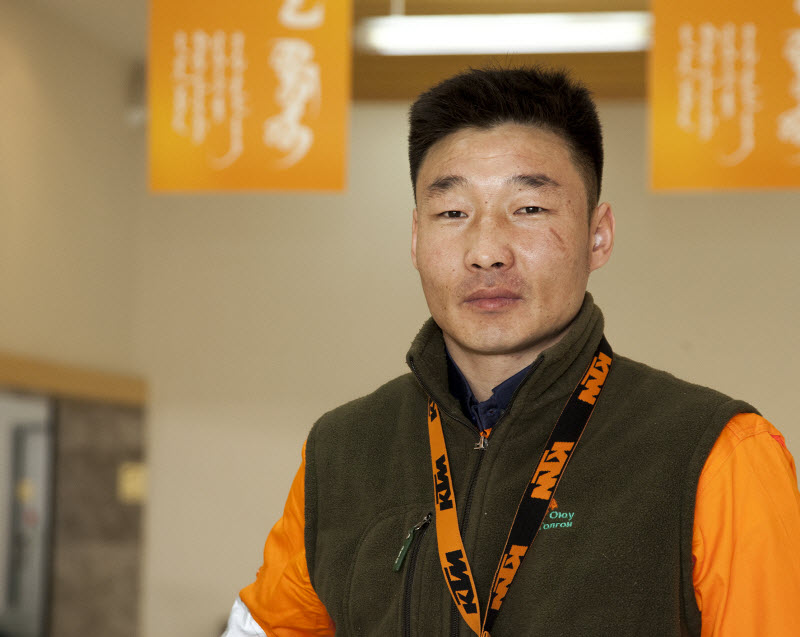Large mining companies require the efforts and labour of many people. This can be seen at the Oyu Tolgoi mine in the South Gobi region. Thousands of people are working and living there along with many support staff and service providers. They comprise many types of professionals, ranging from security guards providing site security to cooks who prepare meals, drivers who drive vehicles and doctors who protect the health of mine workers. Among the support staff, many are native residents of Umnugovi province. This is to be expected since there is a large mine operating in their native land. Journalists who visit the mine site mainly meet and interview engineers and technical specialists. So this time, I specifically wanted to meet with Umnugobi residents who provide support services. They are all veterans who have had their lives linked with Oyu Tolgoi mine for seven to ten years.
 The first thing people who visit Oyu Tolgoi by airplane see is Khanbumbat airport. The first person that I met here was Ts.Ochirbat. This resident of Bayandalai soum of Umnugobi province is an employee with experience of working in three different airports over the last decade. Initially, Oyu Tolgoi had a small airport within the fenced mine area. Then the airport was moved to a temporary airport named Oyut. A Mongolian ger was constructed as a passenger terminal. Then, Khanbumbat, an international standard airport was commissioned where Boeing 737-800 and C-130 cargo transport planes can land and which can serve up to 240 passengers per hour. During this period, Ts.Ochirbat gained new skills and moved up from assistant worker to traffic controller. His work includes numerous tasks such as the registration of passengers and the weighing and monitoring of cargo. He explained that there must be no mistakes in registration of passengers and weighing of cargo, making his job very responsible with no room for mistakes. As Khanbumbat airport was commissioned, new opportunities opened up for local residents.. Residents of Khanbogd soum, which is located about 600 km away from Ulaanbaatar, can now fly from the airport at a discounted price with permission from the soum administration.
The first thing people who visit Oyu Tolgoi by airplane see is Khanbumbat airport. The first person that I met here was Ts.Ochirbat. This resident of Bayandalai soum of Umnugobi province is an employee with experience of working in three different airports over the last decade. Initially, Oyu Tolgoi had a small airport within the fenced mine area. Then the airport was moved to a temporary airport named Oyut. A Mongolian ger was constructed as a passenger terminal. Then, Khanbumbat, an international standard airport was commissioned where Boeing 737-800 and C-130 cargo transport planes can land and which can serve up to 240 passengers per hour. During this period, Ts.Ochirbat gained new skills and moved up from assistant worker to traffic controller. His work includes numerous tasks such as the registration of passengers and the weighing and monitoring of cargo. He explained that there must be no mistakes in registration of passengers and weighing of cargo, making his job very responsible with no room for mistakes. As Khanbumbat airport was commissioned, new opportunities opened up for local residents.. Residents of Khanbogd soum, which is located about 600 km away from Ulaanbaatar, can now fly from the airport at a discounted price with permission from the soum administration.
On the road from the airport to Oyu Tolgoi mine, passengers see many signs. One sign saying that the speed limit is 10 km per hour is seen everywhere. All vehicles are also required to park placing two front wheels in a ditch. People working here are required to attend defensive driving training and obtain special site driving licenses in order to drive vehicles at the site even if they have national driving licenses. This site license is extended every year after passing the annual exam and attending the training course. All these detailed rules are in place because of Oyu Tolgoi’s commitment to safety. Therefore, acquiring a driving license to operate vehicles at the mine site and following traffic rules are almost like complying with the law. If there are drivers or passengers who do not wear seat belts, they can be dismissed. If you cause an accident within the mine site three times, the license is confiscated and you lose the right to drive vehicles at the mine site permanently without any excuses. In other words, you can’t drive any vehicles at the mine site. I met with a person who is always busy since he teaches the driving course and takes driving exams. S.Basbish, a driving instructor, is also a resident of Umnugobi province. He has been working at Oyu Tolgoi for ten years in his professional field, since 2004. Since he has many years of experience, he knows all the road signs and markers by heart. He explained: “Driving vehicles on the mine site is very different. You need to keep the time. There are many rules ranging from strictly following the speed limits and switching the lights on all the time and you also must stop if there is a stop sign even though there are no vehicles around. For us, it is important that these rules are followed by all people.” He showed me a very thick training manual. The manual is used for day-to-day work and includes detailed rules and instructions for drivers to follow. At the mine, safety is always the priority and this is demonstrated by the driving rules which emphasise safety.
 Since Oyu Tolgoi mine runs 24 hours a day, support services also operate on a similar schedule. Most employees of the SSM company, which provides catering services for mine workers, are local residents. One of them is T.Tsetsegmaa. She graduated secondary school in Dalanzadgad soum of Umnugobi province and became a cook in 2007. After graduation, she started out as an assistant at the snack preparation unit. Here people can learn and move to other departments. It all depends on one’s interests. Since she had experience of preparing many different types of snacks, she began to work in the bread and desert preparation unit as the next stage of work. Her team consists of three Mongolian employees and an international consultant. The team receives safety instructions each morning and bakes bread using the dough prepared during the night shift.The department continuously prepares different types of products in large volumes. Day and night shifts prepare four types of white and brown bread and four to five types of deserts using 250-300 kg of flour in total. About 40 kg of flour is required for the production of brown bread. The bread is quite large and it is made in 650 gr and 1.2 kg sizes. This is due to the specifications of the cutting machine. Each piece of bread is then covered with thin film in order to ensure hygiene and protect it from external pollution. Production of desert mixture requires about 1,000 eggs a day. The breads and deserts produced by the team are consumed that day. In other words, miners eat fresh products every single day. T.Tsetsegmaa said: “Many opportunities have been opened for local residents and they must be used. As for me, I’m learning many things from international consultants. I’m also improving my English language at work. I want to develop myself professionally.”
Since Oyu Tolgoi mine runs 24 hours a day, support services also operate on a similar schedule. Most employees of the SSM company, which provides catering services for mine workers, are local residents. One of them is T.Tsetsegmaa. She graduated secondary school in Dalanzadgad soum of Umnugobi province and became a cook in 2007. After graduation, she started out as an assistant at the snack preparation unit. Here people can learn and move to other departments. It all depends on one’s interests. Since she had experience of preparing many different types of snacks, she began to work in the bread and desert preparation unit as the next stage of work. Her team consists of three Mongolian employees and an international consultant. The team receives safety instructions each morning and bakes bread using the dough prepared during the night shift.The department continuously prepares different types of products in large volumes. Day and night shifts prepare four types of white and brown bread and four to five types of deserts using 250-300 kg of flour in total. About 40 kg of flour is required for the production of brown bread. The bread is quite large and it is made in 650 gr and 1.2 kg sizes. This is due to the specifications of the cutting machine. Each piece of bread is then covered with thin film in order to ensure hygiene and protect it from external pollution. Production of desert mixture requires about 1,000 eggs a day. The breads and deserts produced by the team are consumed that day. In other words, miners eat fresh products every single day. T.Tsetsegmaa said: “Many opportunities have been opened for local residents and they must be used. As for me, I’m learning many things from international consultants. I’m also improving my English language at work. I want to develop myself professionally.”
This is a story about the support staff at the mine. The work is being done, life goes on and thousands of young people are producing copper concentrate. South Gobi residents are making their own contribution.
Leave a Reply
You must be logged in to post a comment.